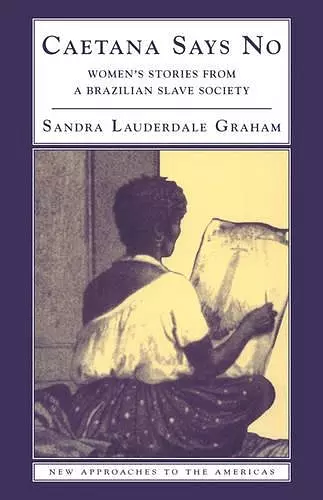Caetana Says No
Women's Stories from a Brazilian Slave Society
Sandra Lauderdale Graham author
Format:Paperback
Publisher:Cambridge University Press
Published:5th Sep '02
Currently unavailable, and unfortunately no date known when it will be back
This paperback is available in another edition too:
- Hardback£44.00(9780521815321)

This 2002 book presents the account of two nineteenth-century Brazilian women struggle to lead a life on their own terms.
Two nineteenth-century Brazilian women - one young and born a slave, the other old and from an illustrious family - fight against the men in their lives. Through these small histories Lauderdale Graham casts new light on larger meanings of slave and free, female and male. This book was first published in 2002.This 2002 book presents the true and dramatic accounts of two nineteenth-century Brazilian women - one young and born a slave, the other old and from an illustrious planter family - and how each sought to retain control of their lives: the slave woman struggling to avoid an unwanted husband; the woman of privilege assuming a patriarch's role to endow a family of her former slaves with the means for a free life. But these women's stories cannot be told without also recalling how their decisions drew them ever more firmly into the orbits of the worldly and influential men who exercised power in their lives. These are stories with a twist: in this society of radically skewed power, Lauderdale Graham reveals that more choices existed for all sides than we first imagine. Through these small histories she casts new light on larger meanings of slave and free, female and male.
"Two women, different roles, both shaking the structures of established male authority through the intransigence of their personal moral decisions. In this marvelous book Lauderdale Graham retrieves two sinuous stories from ecclesiastical and legal archives, and through their close analysis lays bare the stresses, ambivalences and the surprising elasticity of the slave system as practiced in a river valley in southeastern Brazil during the middle decades of the nineteenth-century. 'Brazilian Slavery' will never look the same again." Inga Clendinnen, Reader in History Emeritus at La Trobe University
"Caetana is a finely crafted book on women's lives under patriarchal planters. Readers will appreciate the author's vivid descriptions and analysis of typical Brazilian social customs and gender roles of the nineteenth century. The short length of the book combined with photographs will make this especially attractive for classroom use." The Americas
"This is a fascinating study of gender, slavery and patriarchy, written from the perspective of two remarkable, and at the same time so different, women. It combines imaginative research, engaging narrative, and solid thinking, opening a resonant new perspective on the historiography of nineteenth-century Brazil." Joao Jose Reis, Universidade Federal da Bahia
"Two women, different roles, both shaking the structures of established male authority through the intransigence of their personal moral decisions. In this marvelous book Lauderdale Graham retrieves two sinuous stories from ecclesiastical and legal archives, and through their close analysis lays bare the stresses, ambivalences and the surprising elasticity of the slave system as practiced in a river valley in southeastern Brazil during the middle decades of the nineteenth-century. 'Brazilian Slavery' will never look the same again." Inga Clendinnen, Reader in History Emeritus at La Trobe University
"Sandra Lauderdale Graham's lucidly written and meticulously researched study of women in a slave society calls to mind novelist L.P. Hartley's observation that "the past is a foreign country:they do things differently there." A fascinating read set in the expanding coffee economy of nineteenth-century Brazil, this book links the lives of two women, Caetana and Inacia, who chose to act in ways that subtly challenged the men who held power in their lives. By piecing together their lives and choices, Lauderdale Graham vividly and memorably depicts the complex and competing intersections of gender, race, family, and property that characterized Brazilian slavery." Alida C. Metcalf, Trinity University
"This is a fascinating study of gender, slavery and patriarchy, written from the perspective of two remarkable, and at the same time so different, women. It combines imaginative research, engaging narrative, and solid thinking, opening a resonant new perspective on the historiography of nineteenth-century Brazil." Joao Jose Reis, Universidade Federal da Bahia
"By exploring two mysteries that can't be fully solved, by puzzling over small kindnesses and betrayals in two plantation households, we learn the grammar of rules and exceptions that made up Brazil's nineteenth-century system. These women's predicaments show us the flexible harshness of whimsical, 'cordial' domination in agrarian Brazil." Dain Borges, University of Chicago
"Sandra Lauderdale Graham's lucidly written and meticulously researched study of women in a slave society calls to mind novelist L.P. Hartley's observation that "the past is a foreign country:they do things differently there." A fascinating read set in the expanding coffee economy of nineteenth-century Brazil, this book links the lives of two women, Caetana and Inacia, who chose to act in ways that subtly challenged the men who held power in their lives. By piecing together their lives and choices, Lauderdale Graham vividly and memorably depicts the complex and competing intersections of gender, race, family, and property that characterized Brazilian slavery." Alida C. Metcalf, Trinity University
"Graham has given us a wonderfully insightful glimpse into the history of women in postcolonial Brazil.... This is one of the most lucid and welcome additions to the literature on the subject published in recent years. Highly recommended." Choice
"Lauderdale Graham should be commended for bringing to the attention of English-speaking readers such rich and thought-provoking details of nineteenth-century Brazilian slave society and culture." American Historical Review
ISBN: 9780521893534
Dimensions: 229mm x 152mm x 12mm
Weight: 290g
208 pages